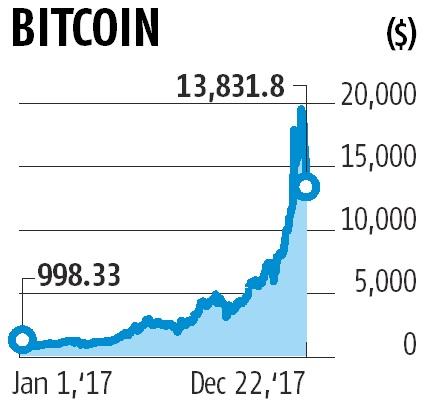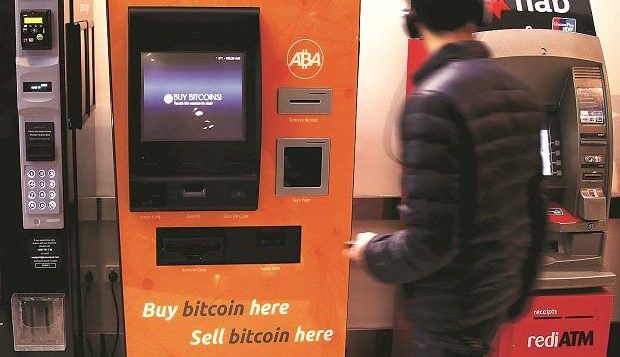At this instant, the market value of bitcoins is around $235 billion with 16.76 million coins in circulation
A few days ago, a small manufacturer of non-alcoholic lemonades and iced teas, did something radical. The New York-based Long Island Iced Teas (listed as LTEA on Nasdaq), which had 2016 revenues of $24 million, changed its name to “Long Blockchain”, opened a new website, www.longblockchain.com, and declared it was investing in developing financial solutions based on the blockchain, the electronic ledger invented by the creator of bitcoin. The shares of “Long Blockchain” jumped 500 per cent in one session on the name-change and then settled down, with a gain of 275 per cent at the time of writing.
Long Blockchain’s zooming stock price is one manifestation of the bubble that has developed around cryptocurrencies. In early January, bitcoin was trading at $998. It hit $20,000 last week, before it collapsed back to $14,000 on massive selling. (These numbers are all taken from https://coinmarketcap.com/ which is about the best of the data sites tracking cryptocurrencies)
At this instant, the market value of bitcoins is around $235 billion with 16.76 million coins in circulation. Compare that to the rupee, where the value of notes issued (December 16) was $260 billion. The rupee is issued by the central bank of a $2.3-trillion economy and one of the most-traded currencies in the world. The bitcoin is a string of computer code generated by mathematical algorithms and verified by anonymous “miners”.
The run-up in bitcoin has been mirrored by similar bull runs in other cryptocurrencies. Some, like Ethereum (up 8,149 per cent in 2017), Ripple (up 17,802 per cent) and Litecoin (up 5,773 per cent), are designed on similar principles with open-source blockchains and improved coding that takes advantage of the technical advances in computing since “Satoshi Nakamoto” released that first mind-boggling paper (Bitcoin: A Peer-to-Peer Electronic Cash System) in October 2008.
Inevitably this bubble has attracted all sorts of people, ranging from speculators who (more or less) understand what they’re doing, to gullible investors, who don’t have a clue. It has also led to a multiplicity of fraudulent, Ponzi schemes, with cheats “designing” cryptocurrencies to make a quick buck. There are over a thousand such currencies doing the rounds at the moment. India has its fair share with “currency designers”, operating out of holes in the wall and using excel sheets to “mine”.
Inevitably this bubble has attracted all sorts of people, ranging from speculators who (more or less) understand what they’re doing, to gullible investors, who don’t have a clue. It has also led to a multiplicity of fraudulent, Ponzi schemes, with cheats “designing” cryptocurrencies to make a quick buck. There are over a thousand such currencies doing the rounds at the moment. India has its fair share with “currency designers”, operating out of holes in the wall and using excel sheets to “mine”.

This has led to several new “business models” that cause concern to regulatory authorities everywhere. First, there’s the “Initial Coin Offering” (ICO) — there are three types of ICOs. One “launches” a new cryptocurrency with kosher code. The second launches a fraudulent cryptocurrency and uses Ponzi principles to pump-up the price. The third raises funding for a start-up (usually blockchain-related but not necessarily) in bitcoin or some other crypto. All three types have been banned in most jurisdictions for reasons that should be obvious.
Another issue for regulators is that bitcoin is anonymous by design. An individual could own a million digital wallets (actually more in literal terms), each capable of holding bitcoin. So long, as he or she does not trade on a recognised exchange which demands KYC (know your customer), there would be no obvious means to link wallet to owner. You could buy bitcoin for USD or Yen cash in Hongkong, or Jersey, or wherever, memorise the wallet codes, and sell it for rupees in India without any trace of the transactions. What’s more, as NRIs have discovered to their delight, the transactions charges are less than standard bank charges for large remittances. Of course, you could lose a packet if the price drops before the transaction is completed.
A third set of business models are entirely legitimate and developing around the blockchain. That concept, an open-source electronic ledger where every transaction can be publicly verified but not tampered with, is being adapted for all sorts of purposes. It enables “trustless” contracts where two anonymous entities can carry out a transaction.
Banks use it to check for internal fraud, Estonia uses it for public services, vintners use it to authenticate vintages, museums to check for art fakes, Dutch municipalities are adopting it, etc. I’m only half-joking when I suggest Satoshi Nakamoto deserves a Nobel for that concept.
A few Fortune500 companies, including Microsoft and a bunch of Japanese multinationals, accept it and it’s quite possible that others will soon. But the currency is illiquid and trades take enormous computing power to verify, consuming massive amounts of power.
Japan, Australia, Estonia have already recognised bitcoin and other well-designed cryptocurrencies as legal tender because you cannot bring regulations against money-laundering, net worth restrictions on exchanges, ICO regulations, etc, to bear, without defining what these things are. Of course, these are nations with open capital accounts where you can exchange the local currency for foreign exchange over the counter.
Dealing with bitcoin and other cryptocurrencies will force India to review its regulatory system and it will require coordination between multiple agencies. It could eventually force an opening of the capital account as well.
Read more at:
http://www.business-standard.com/article/markets/cryptocurrency-gets-its-way-117122900048_1.html







